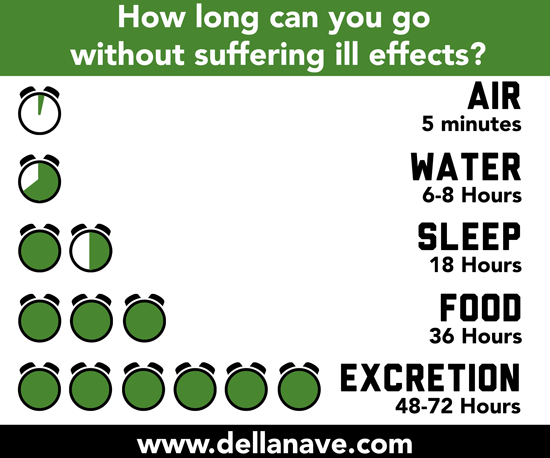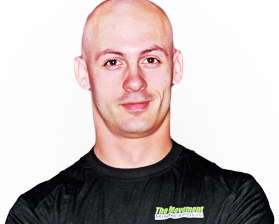
If there is one monumentally important thing you can do for your health and wellness it’s to get better sleep. That’s right, not eat better or exercise but simply get adequate sleep. Not a minimum of sleep, but adequate sleep. Here is something that will hopefully put into perspective the physiological need for sleep:

It’s certainly a false dilemma to say that just one of diet, exercise, or sleep is more important for your health but it is a reality that people will often trade sleep for one or both of the other. To the best of my knowledge none of my clients have ever skipped a workout so that they could prepare a healthy meal, but I recently turned away a new client because he told me he would “sacrifice sleep to make it in to class.” Nope, nope, nope. Not going to happen.
Problems with sleep generally fall into two categories. There are people who don’t prioritize sleep, treating it as something they can do when they’re dead. Which they will be able to do sooner than later as the cumulative cost of chronic sleep debt is a shorter lifespan in addition to poor quality of life. The other category is someone who dedicates adequate time to sleep but has problems getting good quality sleep. Allow me to first address the former.
Sleep is such a critical and auto-regulated function of the human body that to the best of our knowledge it is actually impossible to die from sleep depravation. The reason for this is not that it couldn’t kill you if you could actually achieve it, but that the body will begin a process of micro-sleeping within the gaps between whatever stimulus is keeping you from actually sleeping. In other words, you can try to stay awake by any means and you’ll still fall asleep.
If you are:
- Going to sleep by 10pm, preferably around the time of sunset.
- Allowing adequate time to sleep, about 8-9 hours.
- Sleeping in a completely dark and quiet (not necessarily silent, white noise can help) room.
- Turning off electronics and minimizing light use by 2-hours before sleeping or around sunset.
- Not more than 50 pounds overweight.
- Exercising regularly.
- Avoiding caffeine in the afternoon if you are a slow-metabolizer. You probably know. If you’re a fast-metabolizer, it probably doesn’t matter.
- Use an app like Sleep Cycle. The accuracy of these apps is debatable, but the fact that it brings focused attention to your sleep is not. They help.
And you still can’t sleep you have a problem akin to not being able to swallow water or breathe air. That is how serious it is and how much attention you should divert to addressing it.
The above 8 keys are by no means an exhaustive list, but a damn fine start and will be comprehensive for the vast majority of people. In fact, doing just 5 or 6 of these seven things will probably remarkably improve your sleep.
If you’re not covering all of the above bases, start there. If you have a problem with starting there because there just aren’t enough hours in the day and sleeping isn’t a high priority I’m here to tell you that you’re doing it wrong. I couldn’t possibly do a better job than former Navy SEAL Dr. Kirk Parsley has done in the following video. After leaving the SEALs (BUD/s class 164), Kirk went to med school and later became the team doctor for the west coast teams. If you can’t take it from someone who has suffered through orders of magnitude worse sleep deprivation than you will ever even think about enduring then you’re not going to listen to anyone so you can stop here.
TL;DR? While you think you’re pushing forward and trading productivity for sleep you’re actually selling yourself short and operating at a low level of function compared to what you’re capable of. You might as well be drunk all the time.
Either way it’s time to do the work and fix it. Working too hard to just scrape by barely paying your bills? Go read some Ramit Sethi and make more money with less effort. Making plenty of money and still think whatever you’re doing is more important than sleep? It’s not.


Leave a Reply